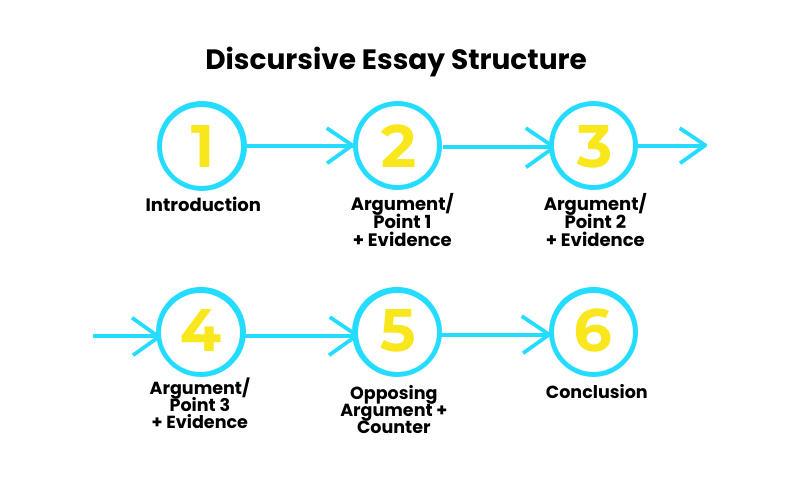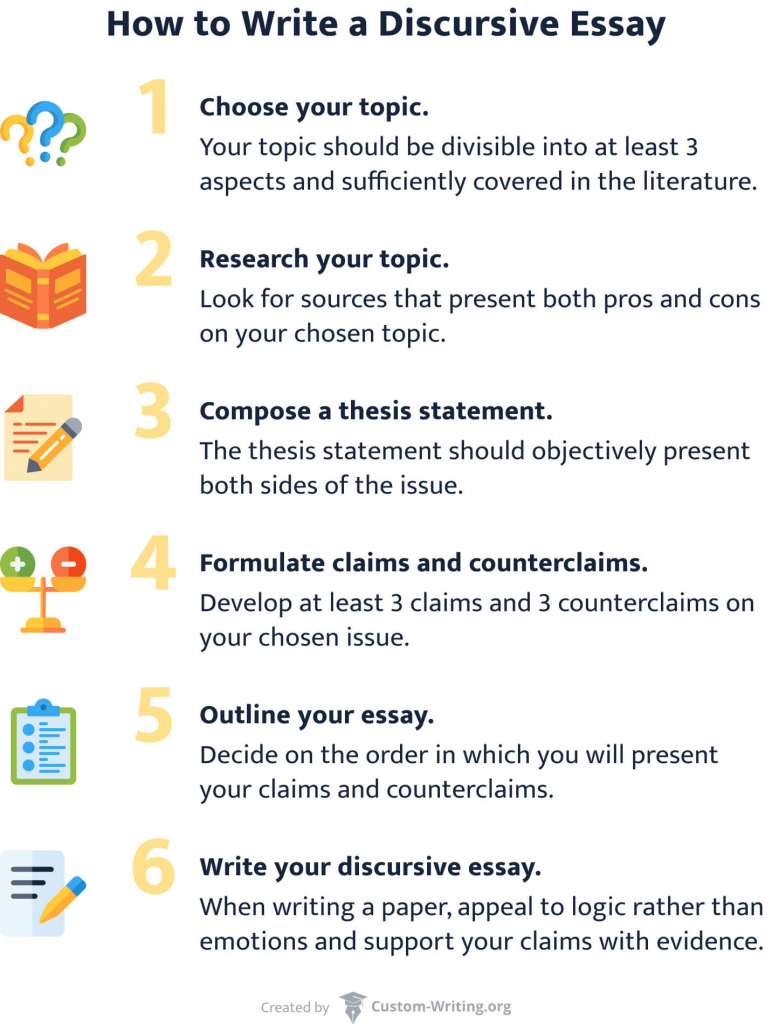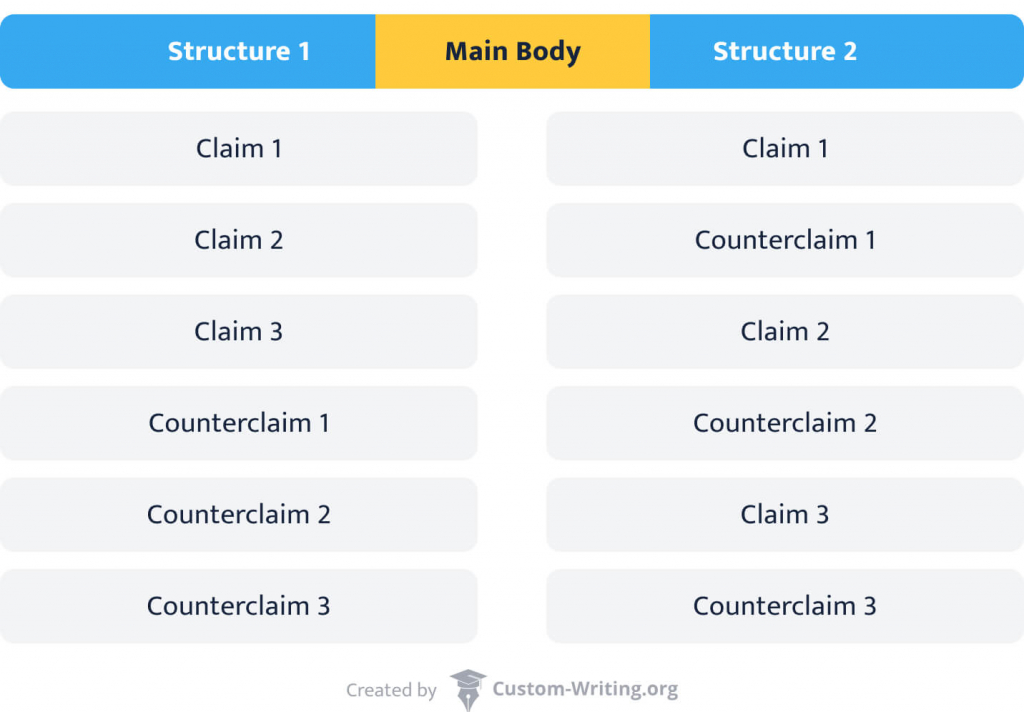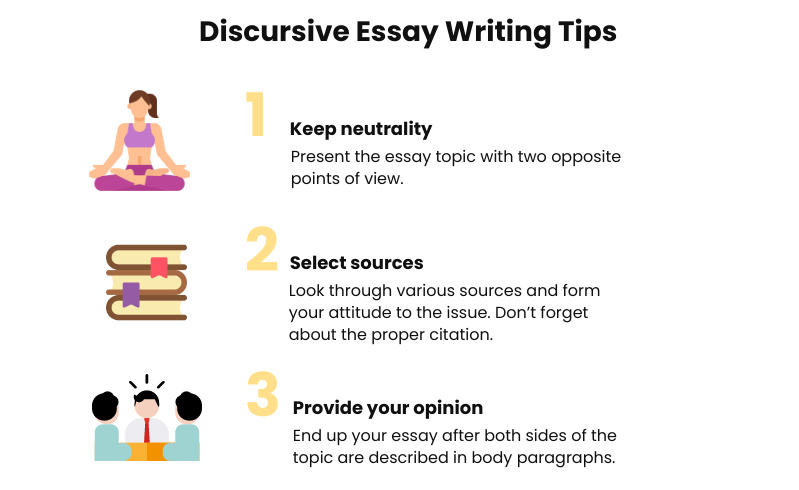A discursive essay is an academic paper that explores a particular issue by presenting arguments from all possible viewpoints. In contrast to other types of assignments, the discursive essay format doesn’t focus solely on positive or negative aspects, encouraging students to engage in thorough analysis and critical thinking.
From this article, prepared by Custom-writing.org experts, you will learn how to write a discursive essay, understand its structure, and see how discursive writing differs from an argumentative essay.
The post will:
- Teach you how to write a discursive thesis statement
- Provide discursive essay examples
- Give tips on writing an introduction, main body, and conclusion
This guide ensures you can master the art of writing discursive essays and excel in your academic journey.
🆚 Argumentative Vs. Discursive Writing
You may think that discursive essays are similar to argumentative ones. It’s true, but only partially. There’s a difference between them in terms of purpose:
- Discursive essays aim to provide a reliable and unbiased assessment of an issue. They don’t have to be completely neutral. Instead, you should write them using the facts and research reports to present both sides of the issue.
- Argumentative essays aim to persuade the reader in your position. This essay requires you to convince as well as educate the reader. The result should be less passionate and more concise than that of a persuasive essay.
And here’s how they differ regarding structure.
Discursive essay structure:
- Start with an introduction to the topic.
- Discuss each essay question in a single paragraph.
- Begin each paragraph with a powerful issue sentence.
- Paragraphs with one point usually followed by a counterpoint paragraph.
Argumentative essay structure:
- Craft a precise thesis statement with your position in the introduction.
- Elaborate on it in the body paragraph, explaining why you’re right.
- Restate and develop your thesis in the conclusion.
- Persuade your reader to agree with your position.
❓ Why Is Discursive Writing Important?
It is hard to overestimate the value of discursive writing for students. It has numerous benefits:
- If you master this type of writing, you will advance in critical thinking and apply your analytical skills by presenting substantiated arguments.
- Discursive writing trains your ability to explore an issue from multiple perspectives. You become more open-minded in tackling complex subjects from any sphere.
- Discursive skills are universally applicable to academic writing, professional presentations and reports, and even real-life scenarios requiring you to provide reasonable, objective arguments.
You may come across discursive writing in the following areas:
- Academic writing. You may receive an open-ended prompt or a direct assignment to compose a discursive essay. Discursive writing is relevant whenever you’re prompted to present an in-depth, critical, and objective subject examination.
- Professional reports and public writing products. Content writers and public personalities need to publish thought-provoking content that stimulates discussions and reflections. Discursive writing is the best way to achieve this goal. This approach is also effective for building social media engagement among followers.
- Creative writing for personal needs. Creative writing tasks can benefit from discursive techniques by enabling a balanced view of the topic. Using this method, you can unpack various meanings and invite your readers to do deeper exploration.
🏁 Discursive Essay: Main Types
There are 6 main types of essay writing:
Exploratory Discursive Essay
As its name suggests, this discursive essay type presupposes an exploration. It discusses the subject without aiming to persuade. Instead, you need to examine various opinions and perspectives on the issue, focusing on their strengths and limitations.
Exploratory discursive essays have the following features:
- Unbiased presentation of facts. You should use a neutral, objective language in the presentation of evidence.
- Open-ended style. There’s no need to defend your opinions or conclusions by allowing readers to make their own deductions instead.
- Presentation of multiple perspectives. Your essay should explore the subject from many angles to give your readers a complete picture.
All in all, an exploratory discursive essay is a sort of initial inquiry into a subject that maps further investigation possibilities for the readers without stressing or prioritizing any of them.
Compare and Contrast Discursive Essay
This type of essay explores similarities and distinctions between two or more related subjects. Anything, from texts or concepts to phenomena or people, can be the subject of a compare-and-contrast discursive essay.
Comparative writing is specific in terms of structure:
- Introduction. The opening section should introduce the subjects and state the features you intend to compare. By adding a hook, you can grab the audience’s attention, and a thesis statement will give readers a sense of direction.
- Body paragraphs. Here, you may structure the content according to one of the two methods – point-by-point or block. Point-by-point relates to addressing one feature in both subjects in every paragraph, and block structure means dedicating separate sections to the subjects.
- Conclusion. The final part of your essay will help you recap the similarities and differences of your subjects to give the readers a complete picture of the comparison.
By following this format, you’re sure to excel in writing compare-and-contrast pieces.
Cause and Effect Discursive Essay
When applying the discursive method to your cause-and-effect essay, you may explore an issue or phenomenon more in-depth. This type of writing can help you identify the roots of a phenomenon and trace the outcomes of specific processes. It also teaches you to determine and explore causation, which gives you a better understanding of the causes and outcomes of a subject of interest. This way, you become more capable of deciphering the immediate and long-term effects of actions, decisions, and processes.
Opinion Discursive Essay
An opinion essay requires your opinion on an issue stated in the introductory paragraph. It should be clearly presented and followed by reasons and supporting examples. Also, such an essay should contain an opposing argument that comes before the conclusion. You must explain to readers why the mentioned argument is considered to be unconvincing. Finally, your opinion should be restated/summarized in the conclusion.
For and Against Discursive Essay
A for and against essay provides readers with a thorough debate on the topic with the help of opposing points of view. Each point should be discussed objectively and described in details.
- The introductory paragraph puts the issue under consideration.
- The main body of this essay paper should present examples, reasons, and arguments supported by justifications.
- The conclusion states the author’s own opinion with balanced reflections on the topic.
Problem Solution Discursive Essay
An essay suggesting solution to a problem discusses problems and finds the main solutions.
- The introduction paragraph explicitly declares a problem and analyses its causes and consequences.
- The main body of the essay should offer some suggestions for a possible solution to the problem and potential state consequences or expected results.
- In the conclusion, author’s opinion should be clearly summarized.
📑 Discursive Essay Format
Keeping to the correct format is key when it comes to discursive writing. Following a well-established structure and approach can help you be more critical about reviewing all viewpoints and aspects of your selected subject. This way, you can explore the full scope of strengths, weaknesses, and unique contributions from every angle to make your analysis broader.
Instead of prioritizing one viewpoint over others, you will present a balanced examination. This, in turn, will allow your readers to go beyond superficial analysis and achieve a deeper understanding of the subject.
So, how do you achieve it?
Well, the main thing you should do is to precisely follow the discursive essay structure. Like most assignments, a discursive paper starts with an introduction and ends with a conclusion; however, each essay part has tricky elements to keep in mind.
Discursive Essay Introduction
The first question you may ask is how to start a discursive essay. Introductions are written in 3 steps:
- Give your readers a hook – something that would sound interesting to them.
- Provide a short explanation of the problem. You may use quotations, as well as rhetorical questions.
- Show your readers both sides of the arguments and sum up. This will be your discursive thesis statement.
Remember that you should avoid stereotypes and generalizations in your essay introduction.
Main Body
The next step of discursive writing you should take is to compose the body.

There are a few points you should remember when working on this essay part:
- Stay unprejudiced. This is the most important thing. Make sure to assess all of the aspects of an issue. Leave your feelings behind or for another essay type.
- Build your argumentation. If you have several arguments for your viewpoint, provide them in separate paragraphs. This will help you to keep your essay comprehensible and distinct. Don’t forget to submit supporting evidence.
- Write the body of an essay in an alternating manner. What does it mean? If your first paragraph supports the paper’s argument, then in the second paragraph you should write something in the opposite of it. Such combination of supporting and opposing paragraphs will make your essay unbiased and well-researched.
- Conclude topic sentences and evidence. Write a summary of the argument at the beginning of the paragraph. It will allow the reader to easier understand what the paragraph is about. Provide evidence to show that you’re not making the facts up.
Discursive Essay Conclusion
You’ve almost finished your writing. Now, you should focus on the last section. Here’s how to write a conclusion for a discursive essay:
- In the last section, you should summarize your text including the main points specified in the body paragraphs.
- You should also express your opinion logically. Remember: it should resonate with your evidence stated in the body paragraphs.
- Don’t repeat findings, just summarize them.
- Keep it short. Your conclusion’s length shouldn’t exceed one paragraph.
✍️ How to Write a Discursive Essay
Now that you’re familiar with the discursive essay format, you’re well-equipped to craft your paper. Simply follow this comprehensive step-by-step guide filled with valuable tips.

1. Choose Your Topic
Selecting an effective topic for your discursive essay is a key step that governs the entire writing process. Here are actionable tips to help you with this:
- The topic should be divisible into at least 3 aspects. This allows for analyzing different perspectives and crafting a well-rounded overview. For example, animal testing has aspects like effectiveness, alternatives, and morality.
- The topic should be sufficiently covered in academic literature. This will provide you with a solid foundation of research and facts to support your arguments. Before finalizing a topic, check that ample information exists on it.
- Claims and counterclaims on the topic should be about the same idea. For example, If the claim is that animal testing effectively enables drug development, the counterclaim could be that differences between species limit the usefulness of animal testing data. Both claims center on the efficacy of animal testing.
2. Research Your Topic
Before writing, research your topic thoroughly to gather pertinent information and evidence. Seek out sources that reinforce and dispute your stance, including academic journals, literature, reputable internet sites, news reports, and expert perspectives.
The most effective approach to discover reliable scholarly sources is exploring your university library or repositories. In this case, you can narrow your search field by applying Boolean operators: AND, OR, and NOT.
- Use AND to find articles that contain both search terms. For instance, looking for “canines AND felines” will display articles referencing both.
- Use OR to find articles that contain either of the search terms. For example, searching for “canines OR felines” will produce articles mentioning one or both.
- Use NOT to exclude specific terms from your search results. Searching for “canines NOT felines” will retrieve articles covering canines only.
3. Compose a Thesis Statement
The next step is to develop your thesis statement: a clear and concise declaration of your main argument.
Here are the key qualities of an effective thesis:
- Two-sided. It presents two sides of the issue rather than being biased and one-sided.
- Written in tentative language. Tentative words and phrases display some uncertainty or caution when presenting the discussion. This helps communicate openness to varied perspectives. Phrases such as “it could be argued” and “there is evidence to suggest” can introduce the thesis in a more nuanced manner.
- Based on research, not just opinion. The thesis gains conviction when it includes research findings, statistics, expert views, and other reliable sources.
4. Formulate Claims and Counterclaims
Before you can start planning your essay structure, it is important to develop clear claims and counterclaims that are connected to each other. Claims constitute the main arguments in support of your thesis statement, while counterclaims present opposing viewpoints that challenge your claims.
For a 1000-word discursive essay, having 3 pros (claims) and 3 cons (counterclaims) is generally sufficient to provide a balanced discussion of the topic, but longer essays may require more arguments.
5. Outline Your Essay
Like any other academic work, a discursive paper consists of an introduction, a main body, and a conclusion. Let’s focus on structuring body paragraphs since this can be the most challenging part for students.
One strategy to structure the main body of a discursive essay goes like this:
- Present all the claims favoring your chosen issue.
- Follow up with counterclaims that challenge or give alternative viewpoints on those arguments.
Another potent strategy is to present a claim and its connected counterclaim within the same paragraph. This method lets you directly contrast different perspectives on one aspect of the topic.

If you need help outlining your essay, try our free essay outline generator.
6. Write Your Discursive Essay
When writing a discursive essay, remember to appeal to logic rather than emotions. It means presenting well-reasoned arguments supported by facts rather than relying on feelings.
It’s common to include in-text citations to support your claims. By citing reputable sources, you will provide evidence and authority to your points, making your essay more credible and persuasive.
When including in-text citations, follow the appropriate citation style (such as APA, MLA, or Chicago) and provide a full reference list at the end of your essay to acknowledge the sources you have used.
👍 Discursive Writing Do’s and Don’ts
Do you want more discursive essay writing tips? Fine! Just check them below:
Basic Do’s of a Discursive Essay
- Write in formal, impersonal style
- Use topic sentences
- Give examples for each point
- Use sequencing and linking words
- Identify used sources
- Follow proper citation style
Basic Don’ts of a Discursive Essay
- Don’t use contractions
- Don’t use overly emotional language
- Don’t use over-generalizations
- Don’t insist on your opinion
- Don’t use personal examples
Well, now you know what discursive essay means, what are its main types, and how to structure it.

Discursive Essay Topics
- Discussion of risk factors that impact human health.
- Discuss the necessity of understanding cultural heritage to provide efficient health care.
- Analyze different opinions on withdrawing patients’ treatment.
- Examine different views on the Civil War.
- Discuss what hostile emotional states are and how they impact human life.
- Discuss the meaning of metaphors used by Virgil in Aeneid.
- Describe different opinions on telehealth in nursing homes.
- The ethicality of stem cell technology.
- Explore the effectiveness of motivational interviewing.
- Discuss how people present themselves online.
- Discuss the reasons for Coca-Cola’s marketing success.
- Analyze the food safety issues and the ways to improve the situation.
- Examine the essential meaning of sleep for people’s physical and mental health.
- Explore various complications of working with groups.
- Discussion of the modern issues with virtue ethics.
- Describe different views on the definition of love.
- Give the for and against arguments considering food security technologies.
- Discuss how the concept of the American dream is presented in the film The Great Gatsby.
- Analyze the influence of family problems on children and suggest ways to improve the situation.
- Present the various points of view on the ethical concepts of Buddhism.
- Examine the attitudes towards the problem of homelessness and the suggested ways of its solution.
- Explore different opinions on the American revolution and its consequences.
- Discuss various policies and views around the globe on abortion.
- Discussion of the history of food foraging in different communities.
- Multiple thoughts on civility on the Internet.
- Analyze arguments on the effectiveness of hand sanitizers.
- Discuss the importance of visual aids in learning.
- Present and evaluate the theories of international development.
- Discuss how to prevent the spread of the West Nile Virus (WNV).
- Is embracing renewable energy sources beneficial for both environment and the global economy?
- Examine the correctness of the statement that the ideology of pleasure is the foundation of social activism.
- Discussion of the ethical dilemma of population control.
- Discuss the ethics of experimental studies.
- Analyze the topic of gun violence and gun control laws.
- Explore the reasons for opioid crises in the US.
- Give arguments for and against random drug testing.
- Discuss the problem of endangered species.
- Express your opinion on the necessity of parents to be included in children’s education.
- Present your attitude towards working in a bureaucratic organization.
- Discuss the issue of the nursing shortage and suggest a solution.
- Give different viewpoints on the definition of beauty.
- Analyze the problem of police misconduct.
- Discuss the description of violence of African people in literature.
- Examine the views on Gardner’s multiple intelligence theory.
- Describe the various opinions on mysticism and express your attitude towards it.
- Discuss the diverse standpoints on spirituality.
- Is nature protection an urgent problem?
- Analyze different ideas on physical privacy at work.
- Discussion on the Jewish heritage in nursing.
- Examine the views on the meaning of life.
📃 Discursive Essay Examples
If you’re looking to enhance your understanding of discursive writing, check out our collection of discursive essay examples. These samples can provide valuable insights into effective argumentation and organization.
- Pros and cons of DSM-5 (Diagnostic and Statistical Manual of Mental Disorders).
- Freedom of speech and restrictions: pros and cons.
- The low-cost provider strategy: pros and cons.
- NASA’s efforts of space colonization: pros and cons.
- Artificial intelligence: pros and cons.
- Cloning discussion: pros and cons.
- Pros and cons of free speech regulations on social media.
- Globalization and its pros and cons.
- Pros and cons of diagnosing patients in mental health practices.
- The Family and Medical Leave Act: pros and cons.
Want to see a fully-formatted sample essay? Feel free to download the PDF file below:
Example:
The debate among professionals and patients regarding the best diet for weight loss is still on. The low-carbohydrate and low-fat diets are among the most popular and used ones.
Good luck with your discussions and discursive essays! Be sure to check out the articles on our blog for more academic wisdom. By the way, on the Custom-Writing website, you may find the best essay topics for your academic writing.
And don’t forget to share your opinion in the comments below.
🤔 Discursive Essay FAQ
How to Write a Good Discursive Essay?
To compose a high-quality piece of discursive writing, you should understand your topic inside and out and explore it from various angles. Make a list of the main points and ensure they align with your selected discourse on the subject. Additionally, find solid supporting evidence for every point to make your essay well-substantiated.
What Is a Typical Discursive Essay Structure?
A discursive essay follows a traditional structure, which includes an introduction, a body, and a conclusion. The introduction should contain a succinct description of your subject and culminate with your main idea, which encompasses the arguments discussed in the body. The final section should wrap everything up and deliver a comprehensive closure on your topic.
How to Start a Discursive Essay?
A great introduction to your discursive essay should be an evidence-based, objective presentation of the subject. Discursive essays don’t imply the voicing of personal opinions or subjective evaluations. Instead, your ideas should be based on facts.
How to Conclude a Discursive Essay?
Like any other essay, a discursive paper’s conclusion needs to bring everything together and revisit your thesis statement. Instead of just summarizing what’s been said, show the progression of your ideas and underline the study’s significance.
You might also be interested in:
- Friendship Essay: Writing Guide & Topic Ideas about Friendship
- Teamwork Essay: Quick Guide on How to Write a Good Paper
- Compare and Contrast Essay Writing Tips and Examples
- Transportation Essay: Writing Tips and Brilliant Topics

![College Essay Writing 101—the Comprehensive Guide [2026]](https://custom-writing.org/blog/wp-content/uploads/2021/01/student-girl-making-notes-in-a-copybook-with-a-pencil-e1565634333206-284x153.png)
![Americanism Essay: Examples, Tips & Topics [2026 Update]](https://custom-writing.org/blog/wp-content/uploads/2020/12/american-flag-284x153.jpg)









It’s very helpful!
it’s a good site to learn from. However, it will be perfect if there is a small essay to clear the mess understanding from the advice
This was so helpful , thank you God bless you
Very good site,thank so much for your effort in writing the posts.
thank you my n word 👨🏿🦳
thank you so much!!!! is there any way to access an annotated example to help?
Thank you so much. That really helped me with writing my essay.
thanku so much for increasing my knowledge
Thank you. It was really helpful. It has answered all my questions.